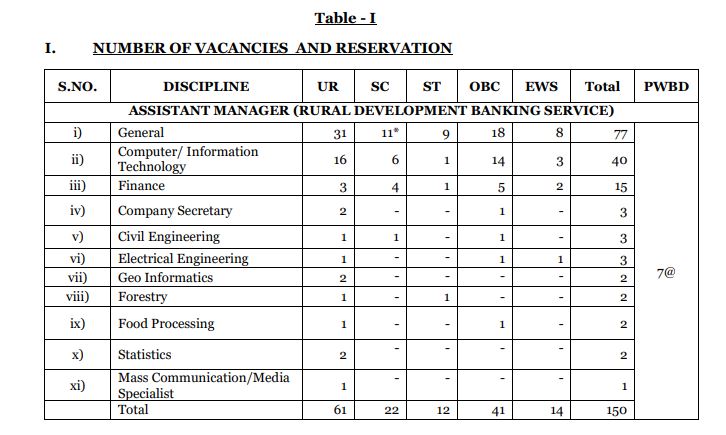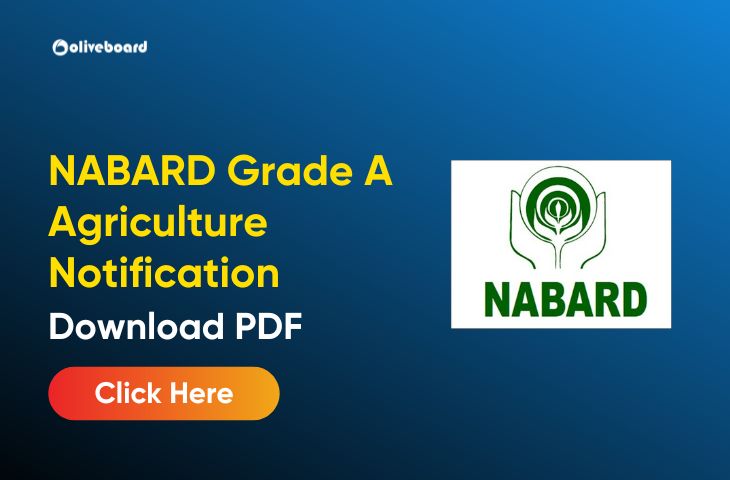NABARD Grade A Agriculture Notification
The NABARD Grade A Agriculture Notification will be out in July 2024 on the official website of NABARD. Last year, no vacancies had been released for the Agriculture discipline but this year it is expected that some vacancies will be out. In this blog post, we intend to provide all the necessary information on NABARD Grade A Agriculture Notification.
NABARD Grade A Agriculture Notification 2024
The notification will be released on the official website for RDBS. The candidates will be able to apply between the application window that will open soon. Last year, the vacancies had not been released for the Agriculture Officers, hence the candidates could apply under General Stream. We have provided the last year’s PDF below, so the candidates can take reference from it.
NABARD Grade A Agriculture Officer 2024 – Important Dates
The schedule for the NABARD Grade A officer exam is provided below :
| Events | Important Dates (Tentative) |
| NABARD Grade A IT Officer Notification Release Date | July 2024 |
| NABARD Grade IT Officer Application Start Date | To be updated |
| NABARD Grade A IT Officer Application End Date | To be updated |
| NABARD Grade A IT Officer (RDBS) – Phase 1 Prelims Exam Date | 1st September 2024 |
| NABARD Grade A Officer – Phase 2 (Mains) Exam Date | 16th October 2024 |
NABARD Grade A Agriculture Vacancies 2024
The vacancies for NABARD Grade ‘A’ AM (RDBS) – Agriculture had not been released last year. We have shared the vacancy table below, as the candidates could apply under the General Stream.

NABARD Grade A Agriculture Notification 2024 – Direct Link to Apply
The application window will remain open for 20-30 days and the candidates must apply for the post as soon as the application begins. This is because during the last days of application, due to some technical errors or high traffic, the server crashes down. Use the direct link given below to apply for NABARD Grade A Agriculture Officer.
Direct Link to Apply for NABARD Agriculture Officer
NABARD Grade A Agriculture Eligibility Criteria
While applying for NABARD Grade A, be aware that you can apply only for ONE Discipline/Post of your choice. If you apply for Assistant Manager in General discipline, you cannot opt for any other discipline like Fisheries, Finance, etc.
NABARD Grade A Agriculture Eligibility – Age Limit
The candidate must be between 21 and 30 years of age which means that the candidate must have been born not earlier than 02-09-1994 and not later than 01-09-2003 as of 1st September 2024 (Expected).
Relaxation in Upper Age Limit
Check out the relaxation provided to different categories in the below table:
| Category | Age Relaxation |
| OBC | 3 years |
| 1. SC/ST 2. Ex-servicemen 3. Emergency Commissioned Officers/Short Service Commissioned Officers 4. Children/family members of victims died in the 1984 riots | 5 years |
| PWBD 1. General 2. OBC 3. SC/ST | 10 years 13 years 15 years |
NABARD Grade A Agriculture Eligibility – Educational Qualification
As the vacancies have not been released in the Agriculture stream, so we have shared the educational qualification for the General stream.
Bachelor’s Degree in any subject from any recognized University/Institution with a minimum of 60% marks (SC/ ST/ PWBD applicants – 55%) in aggregate OR Post Graduate
degree, MBA/PGDM with a minimum of 55% marks (SC/ ST/ PWBD applicants – 50%) in aggregate OR CA/ CS/ICWA OR Ph.D from Institutions recognized by GOI/UGC.
NABARD Grade A Agriculture Exam Pattern
The selection will be in three Phases as furnished below:
- Phase 1 (Preliminary Examination) – 200 Marks
- Phase 2 (Mains Examination) – 200 Marks
- Phase 3 (Interview) – 50 marks
NABARD Grade A Agriculture Exam Pattern 2024 – Prelims
The Prelims Exam Pattern of NABARD Grade ‘A’ Assistant Manager – Agriculture is given below :
| Name of the Test | No. of Questions | Max Marks |
| Test of Reasoning | 20 | 20 |
| English Language | 30 | 30 |
| Computer Knowledge | 20 | 20 |
| Quantitative Aptitude | 20 | 20 |
| Decision Making | 10 | 10 |
| General Awareness | 20 | 20 |
| Eco & Soc. Issues (with focus on Rural India) | 40 | 40 |
| Agriculture & Rural Development with an Emphasis on Rural India | 40 | 40 |
| Total | 200 | 200 |
Important Notes for the Phase 1 Exam (Prelims)
- Qualifying Section – Test of Reasoning, English Language, Computer Knowledge, Quantitative Aptitude, Decision Making.
- Merit Section – General Awareness, Eco & Soc. Issues (with focus on Rural India), Agriculture & Rural Development with Emphasis on Rural India.
- Shortlisting of the candidates for the Main exam will be based on marks scored in the Merit section only.
NABARD Grade A Agriculture Exam Pattern 2024 – Mains
The Mains exam pattern of NABARD Grade A Agriculture Officer (Assistant Manager Exam) is given below :
| Paper | Subject | Type of Paper | Number of Qs | Marks | Duration | Remarks |
| Paper- I | General English | Online Descriptive | 3 | 100 | 90 minutes | Descriptive Answers to be typed using keyboard |
| Paper-II | Agriculture | Objective | 30 | 50 | 30 minutes | – |
| Paper-II | Agriculture | Descriptive Type | 6 You will be required to attempt 4 questions [2 of 15 marks each] | 50 | 90 Minutes | Descriptive Answers to be typed using keyboard either in English or Hindi (Remington and Inscript keyboards) |
The calling ratio to qualify for the main examination and interview would be a maximum of
1:25 and 1:3, respectively.
Negative Marking
- There will be a penalty for wrong answers marked by the candidate.
- For every wrong answer marked, 1/4th of the marks assigned to that question will be deducted as a penalty in Phase-I and Phase-II.
- Cut-offs in Phase-I and Phase-II may be applied in two stages:
- On scores in individual tests
- On Total Score
NABARD Grade A Agriculture Syllabus
NABARD Grade A Phase 1 (prelims) examination and Phase 2 (mains) examination syllabus are given below:
NABARD Grade A Agriculture Syllabus – Prelims
Check out the detailed syllabus below:
| Name of Section | Topics asked |
| Reasoning Ability | 1. Puzzles & Seating arrangement 2. Syllogism 3. Data sufficiency 4. Statement-based questions (Verbal reasoning) 5. Inequality 6. Coding-Decoding 7. Input-Output 8. Blood relations 9. Miscellaneous Questions |
| Quantitative Aptitude | 1. Data Interpretation 2. Quadratic Equations 3. Number Series 4. Simplification/ Approximation 5. Data Sufficiency 6. Arithmetic Questions 7. Quantity Comparisons 8. Mathematical Inequalities |
| English Language | 1. Reading Comprehension 2. Sentence improvement 3. Cloze test 4. Spotting the errors 5. Fill in the blanks 6. Sentence rearrangement 7. Para Jumbles 8. New pattern questions |
| General Awareness | Majorly includes questions from current affairs – Banking, Finance, Insurance, Appointments, Awards and Honours, Sports, Schemes, and National and International Events. |
| Computer Knowledge | It various topics like Networking, Input-output devices, DBMS, MS Office, Internet, History of computers & generations, and Shortcuts. |
Economic and Social Issues
The ESI is one of the most important subjects to excel if you want to clear the NABARD Grade A Exam.
| Name of Section | Topics asked |
| Nature of Indian Economy | 1. Structural and Institutional features 2. Economic Underdevelopment 3. Opening up the Indian Economy 4. Globalization 5. Economic Reforms in India 6. Privatization |
| Inflation | Trends in Inflation & their Impact on National Economy and Individual Income. |
| Poverty Alleviation and Employment Generation in India | Rural and Urban Measurement of Poverty Poverty Alleviation Programmes of the Government |
| Population Trends | Population Growth and Economic Development Population Policy in India |
| Agriculture | 1. Characteristics / Status 2. Technical and Institutional changes in Indian 3. Agriculture 4. Agricultural performance 5. Issues in Food Security in India 6. Non-Institutional and Institutional Agencies in rural credit |
| Industry | 1. Industrial and Labour Policy 2. Industrial performance 3. Regional Imbalance in India’s Industrial Development 4. Public Sector Enterprises |
| Rural banking and financial institutions in India | Reforms in the Banking/ Financial sector. |
| Globalization of Economy | 1. Role of International Funding Institutions 2. IMF & World Bank 3. WTO 4. Regional Economic Cooperation |
| Social Structure in India | 1. Multiculturalism 2. Demographic trends 3. Urbanization and Migration 4. Gender Issues- Joint family system 5. Social Infrastructure 6. Education 7. Health and Environment |
| Education | 1. Status & System of Education 2. Socio-Economic Problems associated with Illiteracy 3. Educational relevance and educational wastage 4. Educational Policy for India |
| Social Justice | Problems with scheduled castes and scheduled tribes Socio-economic programmes for scheduled castes and scheduled tribes and other backward classes. |
| Positive Discrimination in favour of the underprivileged | 1. Social Movements 2. Indian Political Systems 3. Human Development |
Agriculture and Rural Development
This is the section of which the students are scared. But we have created ebooks for free to help you out with this section.
| Name of Section | Topics asked |
| Agriculture | 1. Definition, meaning, and its branches 2. Agronomy: Definition, meaning, and scope of agronomy 3. Classification of field crops 4. Factors affecting crop production 5. Agro Climatic Zones 6. Cropping Systems: Definition and types of cropping systems 7. Problems of dry land – Seed production, seed processing, seed village 8. Meteorology: weather parameters, crop-weather advisory 9. Precision Farming 10. System of Crop Intensification 11. Organic farming |
| Soil and Water Conservation | 1. Major soil types 2. Soil fertility 3. Fertilizers 4. Soil erosion 5. Soil conservation 6. Watershed management |
| Water Resource | 1. Irrigation Management 2. Types of irrigation 3. Sources of irrigation 4. Crop-water requirement 5. Command area development 6. Water conservation techniques 7. Micro-irrigation 8. Irrigation pumps 9. Major, medium, and minor irrigation. |
| Farm and Agri-Engineering | 1. Farm Machinery and Power 2. Sources of power on the farm- human, animal, mechanical, electrical, wind, solar, and biomass, biofuels 3. Water harvesting structures 4. Farm Ponds 5. Agro-Processing 6. Controlled and modified storage, of perishable food storage, godowns, bins, and grain silos |
| Plantation & Horticulture | 1. Definition, meaning, and its branches 2. Agronomic practices and production technology of various plantation and horticulture crops 3. Post-harvest management, value, and supply chain management of Plantation and Horticulture crops. |
| Animal Husbandry | 1. Farm animals and their role in the Indian economy 2. Animal husbandry methods in India 3. Common terms pertaining to different species of livestock 4. Utility classification of breeds of cattle Introduction to common feeds and fodders, their classification, and utility 5. Introduction to the poultry industry in India (past, present, and future status) 6. Common terms pertaining to poultry production and management 7. The concept of mixed farming and its relevance to the socio-economic conditions of farmers in India 8. Complimentary and obligatory nature of livestock and poultry production with that of agricultural farming. |
| Fisheries | 1. Fisheries resources Management and exploitation – freshwater, brackish water, and marine 2. Aquaculture- Inland and marine 3. Biotechnology Post-harvest technology 4. Importance of fisheries in India 5. Common terms pertaining to fish production. |
| Forestry | 1. Basic concepts of Forest and Forestry 2. Principles of silviculture, forest mensuration, forest management, and forest economics 3. Concepts of social forestry, agroforestry, joint forest management 4. Forest policy and legislation in India, India State of Forest Report 2015 5. Recent developments under the Ministry of Environment, Forest, and Climate Change |
| Agriculture Extensions | 1. Its importance and role, methods of evaluation of extension programs 2. Role of Krishi Vigyan Kendra (KVK) in the dissemination of Agricultural technologies |
| Ecology and Climate Change | 1. Ecology and its relevance to man, natural resources, sustainable management, and conservation 2. Causes of climate change, GreenHouse Gases (GHG), major GHG emitting countries, climate analysis 3. Distinguish between adaptation and mitigation 4. Climate change impact on agriculture and rural livelihoods 5. Carbon credit, IPCC, UNFCCC, CoP meetings 6. Funding mechanisms for climate change projects 7. Initiatives by Govt of India, NAPCC, SAPCC, and INDC. |
| Present Scenario of Indian Agriculture and Allied activities | 1. Recent trends 2. Major challenges in agriculture measures to enhance 3. Viability of agriculture 4. Factors of Production in agriculture 5. Agricultural Finance and Marketing 6. Impact of Globalization on Indian Agriculture and issues of Food Security 7. Concept and Types of Farm Management. |
| Rural Development | 1. Concept of Rural Area 2. Structure of the Indian Rural Economy 3. Importance and role of the rural sector in India 4. Economic, Social, and Demographic Characteristics of the Indian rural economy 5. Causes of Rural Backwardness 6. Rural population in India 7. Occupational structure 8. Farmers, Agricultural Laborers, Artisans, Handicrafts, Traders, Forest dwellers/tribes, and others in rural India 9. Trends of change in rural population and rural workforce 10. Problems and conditions of rural labour 11. Issues and challenges in Hand-looms 12. Panchayati Raj Institutions – Functions and MGNREGA, NRLM – Aajeevika, Rural Drinking water 13. Working Programmes, Swachh Bharat, Rural Housing, PURA, and other rural development programs |
NABARD Grade A Agriculture Syllabus 2024 – Mains
Check out the complete mains syllabus below:
| Paper-I – English Topics |
| Essay, Précis writing, Comprehension, and Business/Office Correspondence |
| Paper-II: Syllabus |
| 1. Ecology and its relevance to man, natural resources, their sustainable management, and conservation. 2. Physical and social environment as factors of crop distribution and production. 3. Agroecology; cropping patterns as indicators of environments. 4. Environmental pollution and associated hazards to crops, animals, and humans. 5. Climate change -international conventions and global initiatives. 6. Greenhouse effect and global warming. 7. Advance tools for ecosystem analysis – Remote sensing (RS) and Geographic Information Systems (GIS). |
| 1. Cropping patterns in different agro-climatic zones of the country. 2. Impact of high-yielding and short-duration varieties on shifts in cropping patterns. 3. Concepts of various cropping and farming systems. 4. Organic and Precision farming. 5. Package of practices for production of important cereals, pulses, oilseeds, fibres, sugar, commercial and fodder crops. |
| 1. Important features and scope of various types of forestry plantations such as social forestry, agro-forestry, and natural forests. 2. Propagation of forest plants. 3. Forest products. 4. Agroforestry and value addition. 5. Conservation of forest flora and fauna. |
| 1. Weeds, their characteristics, dissemination, and association with various crops; their multiplications; cultural, biological, and chemical control of weeds. 2. Soil- physical, chemical, and biological properties. 3. Processes and factors of soil formation. 4. Soils of India. 5. Mineral and organic constituents of soils and their role in maintaining soil productivity. 6. Essential plant nutrients and other beneficial elements in soils and plants. 7. Principles of soil fertility, soil testing and fertilizer recommendations, integrated nutrient management. 8. Biofertilizers. 9. Losses of nitrogen in the soil, nitrogen-use efficiency in submerged rice soils, and nitrogen fixation in soils. 10. Efficient phosphorus and potassium use. 11. Problem soils and their reclamation. 12. Soil factors affecting greenhouse gas emissions. |
| 1. Soil conservation, integrated watershed management. 2. Soil erosion and its management. 3. Dryland agriculture and its problems. 4. Technology for stabilizing agriculture production in rain-fed areas. 5. Water-use efficiency in relation to crop production, criteria for scheduling irrigations, ways, and means of reducing runoff losses of irrigation water. 6. Rainwater harvesting. 7. Drip and sprinkler irrigation. 8. Drainage of waterlogged soils, quality of irrigation water, the effect of industrial effluents on soil, and water pollution. 9. Irrigation projects in India. |
| 1. Farm management, scope, importance and characteristics, farm planning. 2. Optimum resource use and budgeting. Economics of different types of farming systems. 3. Marketing management – strategies for development, market intelligence. 4. Price fluctuations and their cost; the role of co-operatives in agricultural economy; types and systems of farming and factors affecting them. 5. Agricultural price policy. Crop Insurance. |
| 1. Agricultural extension, its importance, role, methods of evaluation of extension programmes, socio-economic survey, and status of big, small, and marginal farmers and landless agricultural labourers. 2. Training programmes for extension workers. 3. Role of Krishi Vigyan Kendra’s (KVK) in the dissemination of Agricultural technologies. 4. Non-Government Organization (NGO) and self-help group approach for rural development. |
| 1. Cell structure, function, and cell cycle. 2. Synthesis, structure, and function of genetic material. 3. Laws of heredity. 4. Chromosome structure, chromosomal aberrations, linkage and cross-over, and their significance in recombination breeding. 5. Polyploidy, euploids, and aneuploids. 6. Mutations – and their role in crop improvement. 7. Heritability, sterility and incompatibility, classification, and their application in crop improvement. 8. Cytoplasmic inheritance, sex-linked, sex-influenced and sex-limited characters. |
| 1. History of plant breeding. 2. Modes of reproduction, selfing, and crossing techniques. 3. Origin, evolution, and domestication of crop plants, center of origin, the law of homologous series, crop genetic resources conservation, and utilization. 4. Application of principles of plant breeding, and improvement of crop plants. 5. Molecular markers and their application in plant improvement. 6. Pure-line selection, pedigree, mass, and recurrent selections, combining ability, its significance in plant breeding. 7. Heterosis and its exploitation. 8. Somatic hybridization. 9. Breeding for disease and pest resistance. 10. Role of interspecific and intergeneric hybridization. 11. Role of genetic engineering and biotechnology in crop improvement. 12. Genetically modified crop plants. |
| 1. Seed production and processing technologies. 2. Seed certification, seed testing, and storage. 3. DNA fingerprinting and seed registration. 4. Role of public and private sectors in seed production and marketing. 5. Intellectual Property Rights (IPR) issues, WTO issues, and its impact on Agriculture. |
| 1. Principles of Plant Physiology with reference to plant nutrition, absorption, translocation, and metabolism of nutrients. 2. Soil – water- plant relationship. |
| 1. Enzymes and plant pigments; photosynthesis- modern concepts and factors affecting the process, aerobic and anaerobic respiration; C3, C4, and CAM mechanisms. 2. Carbohydrate, protein, and fat metabolism. 3. Growth and development; photoperiodism and vernalization. 4. Plant growth substances and their role in crop production. 5. Physiology of seed development and germination; dormancy. 6. Stress physiology – drought, salt, and water stress. |
| 1. Major fruits, plantation crops, vegetables, spices, and flower crops. 2. Package practices of major horticultural crops. 3. Protected cultivation and high-tech horticulture. 4. Post-harvest technology and value addition of fruits and vegetables. 5. Landscaping and commercial floriculture. 6. Medicinal and aromatic plants. 7. Role of fruits and vegetables in human nutrition. |
| 1. Diagnosis of pests and diseases of field crops, vegetables, orchards, and plantation crops and their economic importance. 2. Classification of pests and diseases and their management. 3. Integrated pest and disease management. 4. Storage pests and their management. 5. Biological control of pests and diseases. 6. Epidemiology and forecasting of major crop pests and diseases. 7. Plant quarantine measures. 8. Pesticides, their formulation, and modes of action |
| 1. Food production and consumption trends in India. 2. Food security and growing population – vision 2020. 3. Reasons for grain surplus. 4. National and international food policies. 5. Production, procurement, distribution constraints. 6. Availability of food grains, per capita expenditure on food. 7. Trends in poverty, Public Distribution System and Below Poverty Line population, 8. Targeted Public Distribution System (PDS), policy implementation in context to globalization. 9. Processing constraints. 10. Relation of food production to National Dietary Guidelines and food consumption pattern. 11. Food-based dietary approaches to eliminate hunger. 12. Nutrient deficiency – Micronutrient deficiency: Protein Energy, Malnutrition or Protein Calorie Malnutrition (PEM or PCM), Micronutrient deficiency, and HRD in the context of the work capacity of women and children. 13. Food grain productivity and food security. |
How to Prepare for NABARD Grade A Exam?
If you are a candidate who has never prepared for the NABARD Grade A Exam before and is scared of the Agriculture section that is asked in the exam, then you must check out the following success stories:
Success Story of Anantha Giri Padmanabhan
Success Story of Himanshu Baliyan
Special Note: Any Graduate candidate from any discipline can apply for this exam. With a systematic way of preparation, aspirants can smoothly get good marks in the Agriculture section.
NABARD Grade A Agriculture Notification 2024 FAQs
The NABARD Grade A Agriculture Notification will be out in July 2024.
The candidates can apply only within the application window. The dates will be notified soon.
The candidates with Bachelor’s or Master’s degree in relevant discipline.
Yes, the third phase of the selection process is the Interview and you will have to clear all three phases to get finally selected.
For SC/ST/PwBD, it is Rs 150 and for others, it is Rs 800.
Preparing for Regulatory Exams? Need regular updates of CA, Notifications, Free Ebooks, YT Sessions, and More, then Join Our Regulatory Whatsapp Channel.
If you are preparing for Regulatory Exams, then do not forget to check out all the blogs on the regulatory exams. Check Regulatory Exam Blogs.
Get Daily FREE Material for RBI Grade B, NABARD Grade A, SEBI Grade A, IFSCA Grade A, and SIDBI Grade A, IRDAI Assistant Manager – Join Oliveboard’s Regulatory Exam Telegram Channel
Attempt Engaging Quiz on YTC and get complete study material and classes for RBI Grade B, NABARD Grade A, SEBI Grade A, IFSCA Grade A, and SIDBI Grade A, IRDAI Assistant Manager- Subscribe to Oliveboard’s Regulatory Exam Youtube Channel
- SIDBI Grade B Books 2025, Get Subject Wise List

- SIDBI Grade B Notification 2025 Out, Apply for 26 Vacancies

- SIDBI Grade B Syllabus & Exam Pattern 2025, Download PDF

- SIDBI Grade B Eligibility 2025, Age, Qualification, Nationality

- SIDBI Grade B Apply Online 2025, Link Active Till 11 August

- SIDBI Grade B Preparation Strategy & Previous Exam Analysis


Hello there! I’m a dedicated Government Job aspirant turned passionate writer & content marketer. My blogs are a one-stop destination for accurate and comprehensive information on exams like Regulatory Bodies, Banking, SSC, State PSCs, and more. I’m on a mission to provide you with all the details you need, conveniently in one place. When I’m not writing and marketing, you’ll find me happily experimenting in the kitchen, cooking up delightful treats. Join me on this journey of knowledge and flavors!
